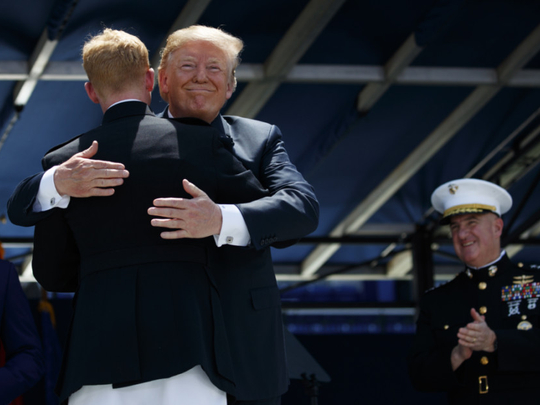
Annapolis, Maryland: President Donald Trump declared Friday that the United States is “respected again” because of a military that is “a lot stronger,” as he welcomed the 2018 graduates of the Naval Academy into what he called “the most powerful and rightful force on the planet.”
Presidents often use the annual commencement addresses at the country’s military academies to tout their foreign policy successes, urging the next generation of military officers to embrace the commander in chief’s vision of a world worthy of protecting.
Trump did that, saying — without specifics — that the new naval officers and Marines should be proud to be joining a military that he said is now recovering from years of shrinkage and decay.
“We are witnessing the great reawakening of the American spirit and of American might,” he said to applause from the 30,000 people in the Naval Academy’s stadium. “We have rediscovered our identity, regained our stride and we are proud again.”
Trump’s predecessors have also used the commencements to confront the challenges of foreign policy, diplomacy and war. In 2002, after the 9/11 attacks, President George W. Bush announced a policy of pre-emptive war during his address at the Army’s West Point commencement.
Trump made no mention of broad foreign policy issues or specific challenges that the country faces abroad, including the collapse of his efforts at international diplomacy on the Korean Peninsula. On Thursday, Trump abruptly called off his planned summit meeting with Kim Jong-un, the leader of North Korea, citing his counterpart’s “open hostility” in public statements.
The president has been intensely focused on the size and capabilities of the US military since before he took office. And once in charge of the government, Trump repeatedly pledged to increase funding to the armed services that he viewed as having shrivelled in previous years.
While the Pentagon’s base budget was capped in 2011, funding for the military still far outstripped the rest of the world and was still higher than the next seven countries combined.
In the first months of his presidency, Trump visited the Navy’s newest aircraft carrier, the Gerald R. Ford, and promised to work to “upgrade” ships and submarines and seek more money for the sailors who operate them.
“We’ll have by far the most powerful nuclear force on Earth, and it’ll be absolutely in perfect shape and condition,” Trump told the sailors on the ship that day. “And hopefully, praise be to God, we don’t ever have to use it. But there will be nobody that’s even close.”
In his remarks at the commencement Friday, Trump took note of the carrier Ford as he touted the size and strength of the country’s naval forces, including what he said will eventually be “355 beautiful ships” in the fleet. He said that is “almost a couple of hundred more ships” than currently in the fleet.
In fact, in 2016, the number of active ships was 275 and the Navy plans to increase that size to 355 — by the 2050s.
“We’re building that modern fleet,” he said. “We’re sharpening the fighting edge of everything.”
As president, Trump signed a $1.3 trillion (Dh4.77 trillion) government spending bill that dramatically increased the amount of money for the military. At the signing, the president complained that he did not want to sign the legislation because it failed to close immigration loopholes or provide enough money for a wall along the border with Mexico.
But he said the money for the military was enough to convince him to sign the bill anyway.
“It increases total defence spending by more than $60 billion from last year, and funds the addition of critically needed ships, planes, helicopters, tanks and submarines,” he said during brief remarks after signing the spending bill. “We have submarines being built the likes of which — there’s nothing anywhere in the world like the submarines we build.”
“Therefore,” he added, “as a matter of national security I’ve signed this omnibus budget bill.”
Trump has also promised repeatedly to help veterans by reforming the Department of Veterans Affairs, a long-struggling bureaucracy. He succeeded in pushing through some bipartisan legislation aimed at improving service delivery to veterans.
During his remarks at the Naval Academy, Trump underscored those successes. He said new legislation would allow employees of the Veterans Affairs department to be quickly fired if they are not doing a good job of caring for the health and well-being of veterans.
“We’re going to take care of our great veterans,” he said. “We are taking care, finally, after decades, we are taking care of our veterans.”
But the president’s efforts have been stymied in part by difficulties with the department’s leadership.
He fired David J. Shulkin, his first secretary of Veterans Affairs, after reports of excessive overseas travel and a revolt among Shulkin’s senior staff over the issue of privatisation of services at the department. But Trump’s choice to replace Shulkin — Dr. Ronny L. Jackson, a Navy rear admiral and the president’s one-time White House doctor — withdrew from consideration after accusations that he berated his staff, dispensed medications too liberally and was drunk at work.
Trump has nominated Robert Wilkie, the acting secretary of Veterans Affairs, to take the post permanently.
During the speech Friday, Trump bragged about increasing the size of the military and said that a more powerful army, navy and air force would help keep the country safe by preventing the need to use them in the first place.
“The best way to prevent war is to be fully prepared for war,” Trump told the graduates.
Still, he added, “if a fight must come, there is no other alternative — victory, winning, beautiful words, but that is what it is all about.”
His final words for the graduates: “Anchors aweigh!”












